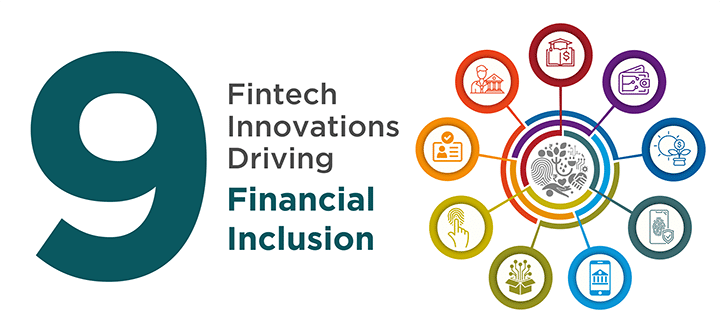With over 90% of online payments in India being driven by new-age fintech firms in August 2024, their pivotal role in financial inclusion is undeniable.
Fintech companies are enabling governments and banks to extend essential financial services to marginalized populations, ensuring that even the most underserved communities can access these services.
According to the World Bank, over 1.6 billion adults globally remain unbanked as of 2024. Fintech firms, through innovative technologies, are bridging this gap, playing a key role in financial inclusion initiatives.
In this blog, we explore nine ways Indian fintech firms are empowering governments and banks to drive financial inclusion.
1. Digital Wallet Wonders
Digital wallets are transforming the way people engage with financial services. Fintech firms, such as Evolute Fintech Innovations, offer secure, user-friendly digital wallet solutions.
These wallets are designed to meet the needs of diverse populations, including rural communities, enabling the unbanked to access, store, and use money directly from their mobile phones, through schemes like Bank Sakhis.
2. Microloans and Microcredit Marvels
Microloans and microcredit facilities are opening doors for individuals and small businesses who previously had no access to credit. Fintech companies use alternative credit scoring models—like evaluating daily revenue for small restaurants—to assess creditworthiness.
Programs like India’s MUDRA loan, supported by fintech-driven solutions, have helped integrate millions into the financial fold. The International Finance Corporation estimates that fintech-led microfinance could reach over 500 million people worldwide by 2024.
3. Digital Authentication Verification
One of the most significant barriers to financial inclusion is identity verification. Fintech firms like Evolute Fintech Solutions leverage biometric verification, such as iris scans, facial recognition, and AI-driven identity checks, allowing even those without formal documentation or communities that don’t allow taking pictures to securely access financial services.
This helps reduce fraud while empowering governments and institutions to serve marginalized communities more effectively.
4. Mobile Banking
Mobile banking is a game changer in the push for financial inclusion. Fintech firms are working with banks and governments to create mobile platforms that enable users to open accounts, transfer money, and access services via mobile phones.
According to GSMA, mobile money accounts exceeded 1 billion globally by 2020, a testament to the growing influence of mobile banking.
5. Digital Financial Products
Digital financial products are reshaping the financial landscape by making services more accessible. With over 67% of the global population using mobile devices, products like mobile wallets, microlending apps, and digital insurance are empowering millions.
By integrating technologies such as AI and blockchain, fintech firms are reducing costs and improving access to personalized financial tools, especially for underserved communities.
6. Biometric Authentication Breakthroughs
Biometric authentication is revolutionizing financial access. By incorporating fingerprint and facial recognition technology, fintech firms ensure that even those without traditional identification can securely access financial services.
This technology is vital in regions where formal ID systems are underdeveloped or nonexistent.
7. Real-Time KYC Solutions from Fintech Firms
Traditional KYC (Know Your Customer) processes can slow down financial inclusion efforts. Fintech firms like Evolute Fintech are solving this issue with real-time KYC solutions. Using AI and biometric data, they provide instant verification, reducing onboarding time from days to minutes.
This allows underserved populations to quickly access financial services, accelerating financial inclusion at scale.
8. Agent Banking Advancements
Agent banking is expanding the reach of financial services to remote and underserved areas. Local agents, equipped with fintech tools, bring banking to their communities.
A study by McKinsey predicts that agent banking could enable an additional 1.6 billion people to access financial services by 2024, further driving financial inclusion.
9. Education and Financial Literacy Empowerment
Financial literacy is fundamental to financial inclusion. Fintech companies are developing educational tools to help underserved populations understand financial products and services.
By promoting financial literacy, fintech firms empower individuals to make informed decisions, enhancing their financial well-being and further driving inclusion.
Conclusion
Fintech firms are at the forefront of the financial inclusion revolution, leveraging innovative technologies to empower governments and banks to serve underserved populations. From digital wallets and microloans to biometric verification and mobile banking, these firms are driving inclusive growth and transforming the financial ecosystem. Evolute Fintech Innovations is a key player in this movement, providing cutting-edge solutions that are helping millions gain access to essential financial services.
In summary, here are the nine key ways fintech firms are empowering financial inclusion:
1. Digital Wallet Wonders
2. Microloans and Microcredit Marvels
3. Digital Authentication Verification
4. Mobile Banking
5. Digital Financial Products
6. Biometric Authentication Breakthroughs
7. Real-Time KYC Solutions
8. Agent Banking Advancements
9. Education and Financial Literacy Empowerment
These innovations are shaping a future where financial services are accessible to all, driving economic growth and reducing inequality.





